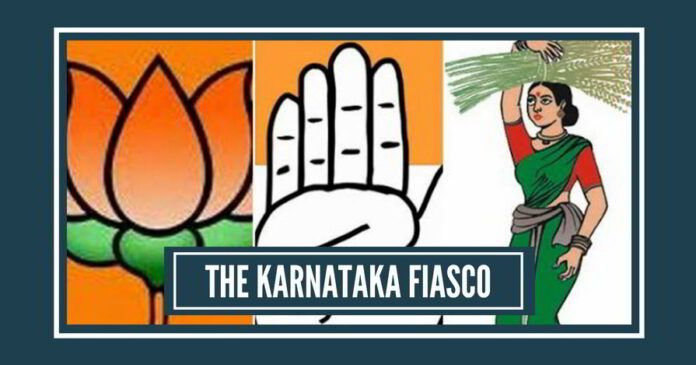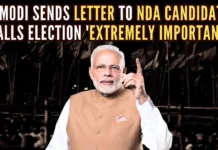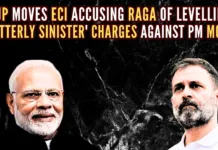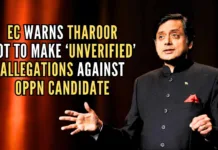
Supreme Court or any High Court cannot adjudicate upon the propriety of an action taken by the Governor.
We, the people of India, having solemnly resolved to constitute India into a Sovereign Socialist Secular Democratic Republic and to secure to its citizens; Justice social, economic and political;
This is how The Preamble to The Constitution of India, 1950 starts.
The Constitution provides for the exercise of jurisdiction by courts and also bars jurisdiction in certain cases. Article 131 speaks about the original jurisdiction of the Supreme Court. It runs as follows:
Article 131:
Subject to the provisions of this Constitution, the Supreme Court, shall to the exclusion of any other court, have original jurisdiction in any dispute –
a) between the Government of India and one or more states; or
b) between the Government of India and any State or States on one side and one or more other States on the other; or
c) between two or more States,
if and in so far as the dispute involves any question (whether of law or fact) on which the existence or extent of a legal right depends:
Though one would laud The Supreme Court for holding a special sitting during the night, I believe it was not necessary.
It is clear that the case involving the Assembly election in Karnataka does not fall under sub-clauses (a) (b) or (c). It is a case of the Governor exercising his power and the aggrieved parties questioning it. In fact, the State is not at all involved. 3 political parties, the BJP, Congress and JD(S) are involved. The Governor may be the Executive Head of the State but it is his action that is involved not any act of State. The Central Government is not involved in the process, though allegations of an influence of the Central Government may be alleged.
Therefore, the Supreme Court may not have jurisdiction to entertain an original petition or even a writ petition.
Therefore, the Congress and the JD(S) could at best approach only the High Court and not the Apex Court. By impleading the Central Government, the jurisdiction of the Supreme Court cannot be invoked. The Central Government is not at all a necessary party. No relief can be obtained against it. The Apex Court itself has self-imposed restriction not to entertain petition directly though perhaps nobody can question the exercise of jurisdiction by The Supreme Court. The Supreme Court has however chosen to entertain the petition. Though one would laud The Supreme Court for holding a special sitting during the night, I believe it was not necessary. It is settled law that interim stay is not granted regarding election matters and in this case, the Apex Court has refused to stay the swearing-in. There was no need for the Supreme Court to have heard the matter during the night. “The court could have well said that there shall be no stay and case will be taken up at 10.30 AM”. But, the Supreme Court perhaps wanted to acknowledge the urgency. It is paradoxical that the Congress which moved an impeachment motion approached the same Chief Justice for relief. The Chief Justice did well not to keep this in mind. Perhaps it was the Congress that felt embarrassed and therefore represented the cause through another senior lawyer and not Mr.Kapil Sibal who roared before that court 2 weeks ago only to withdraw the case. Again, the Congress and JD(S) are roaring for no reason.
Apart from the question of the original jurisdiction, there is a clear bar under the Constitution of an action of Governor being questioned even in the Supreme Court. The Governor of the State is appointed by the President of India and as per Article 154 of the Constitution is the executive head of the State. Therefore, a Governor cannot be said to be representing the Centre and thereby the jurisdiction of the Apex Court cannot be invoked. Under Article 361 of the Constitution, The Governor enjoys complete immunity. Clause (1) clearly states that the Governor is not answerable to any court for exercise or performance of the powers and duties of his office for any act done or purporting to be done for exercising and performance of those powers and duties of his office. It reads Protection of President and Governors and Rajpramukhs.
The President, or the Governor or Rajpramukh of a State, shall not be answerable to any Court for the exercise and performance of the powers and duties of his office or for any act or purporting to be done by him in the exercise and performance of those powers and duties:
Provided that the conduct of the President may be brought under review by any Court, tribunal or body appointed or designated by either House of Parliament for the investigation of a charge under article 61:
Provided further that nothing in this clause shall be construed as restricting the right of any person to bring appropriate proceedings against the Government of India or the Government of a State.
Under clause (2) even criminal proceedings are barred. It reads
Article 361(2) No criminal proceedings whatsoever shall be instituted or continued against the President, or the Governor of State, in any Court during his term of Office.
If so, the Supreme Court or any High Court cannot adjudicate upon the propriety of an action taken by the Governor in calling the single largest party first, to form a government. No case questioning the action of the Governor can proceed in his absence. Therefore, neither can a case be filed against him questioning the action nor can his action be decided in his absence.
Article 212 reads as follows:
Courts not to inquire into proceedings of the Legislature.
1) The validity of any proceedings in the Legislature of a State shall not be called in question on the ground of any alleged irregularity of procedure.
2) No officer or member of the Legislature of a State in whom powers are vested by or under this Constitution for regulating procedure or the conduct of business, or for maintaining order, Legislature shall be subject to the jurisdiction of any Court in respect of the exercise by him of those powers.
The Supreme Court judges and the Governors are appointed by the President of India. Both enjoy immunity for their acts.
It bars proceedings questioning the actions of the State legislature in any court relating to the alleged irregularity of the procedure. The act of the Governor should certainly be construed as part of the proceedings of the legislature and cannot be questioned.
We may draw strength from
Article 168 clause (1) which reads as follows:
For every State, there shall be legislature which shall consist of the Governor
Therefore, Governor is part of the legislature.
Therefore, the action of the Governor is not justiciable in any court. If the Constitution makers had wanted the subject the subjective satisfaction of a Governor to the jurisdiction of Constitutional Courts, then, the exception would have been certainly made. Though in the past, cases had been entertained by the Supreme Court I do not think in any case the Governor was made a party or that his action was held to be invalid. Any such verdict would be without jurisdiction and the Supreme Court itself has held on several occasions, that a judgment against statute is void and is non-est in law. It will neither create estoppel nor res judicata nor be a judicial precedent.
Judges are human beings. They are prone to errors. That is why the Supreme Court itself has held that even an erroneous judgment on a question of law is binding and that a wrong decision of a court is as much binding as a right decision. If so, the Governor’s decision, even if wrong or even malicious, is binding on the persons concerned. If decisions of the Governor are to be made justiciable then there will be no meaning to the immunity granted. under Article 361.
In fact, a question arises about the status of Supreme Court judges, vis-a-vis Governors. Both are appointed by the President of India. Both enjoy immunity for their acts. If the decision of a High Court Judge or a Supreme Court Judge cannot be questioned, could the action of a Governor be questioned? In a way, the Governors enjoy a superior status as Judges are appointed to discharge judicial functions and are governed by conditions of service, age, and other qualifications. They can be removed by a procedure of impeachment by the Parliament. But except the minimum age qualification of 35 years, there is no other criterion involved for Governors. No upper age limit is fixed. The Governor is not governed by service rules and cannot be removed by impeachment. He can be removed only by The President of India.
Therefore, Governors should be construed to be on a higher pedestal than High Court judges and Supreme Court judges. On this ground also the Constitutional courts may not be empowered to adjudge the propriety of a Governor’s action. The court cannot call upon the Governor to give any explanation. If a person’s act is immune there is no question of testing its validity. The Governor cannot be impleaded as a party. Notice cannot be sent to him. He cannot be called to explain his stand by filing counter-affidavit. Whileso, how can the Supreme Court quash the proceeding, or decide about it? Can the Governor’s action be set aside in his absence? Or, can the Centre or the BJP be asked to justify the Governor’s action?
The Supreme Court would do well to take these aspects into consideration in the case at hand. The BJP could well urge these aspects in the case before The Supreme Court.
. . . to be continued
- The Karnataka Fiasco and special status of the Governor – Part 2 - May 19, 2018
- The Karnataka Fiasco - May 18, 2018











The SC had jurisdiction to entertain the petition – anybody can petition against anyone in the Republic of India.
The SC had/has powers, under the petition and the Constitution, to issue notice to the Government of Karnataka (Governor) and the Government of India (Governor or President of India.) asking them to Respond to the petition if they would like to Respond.
The SC had/has NO powers to compel the GOK or the GOI, under this petition, to Respond to the Notices. Accordingly a sensible rational SC would merely issue Notice and stop.
The bench of the SC that heard this petition is evidently a bunch of jokers who are illiterate about the Constitution. The Attorney General of India who Responded to the Notice issued to the GOI is evidently a head joker equally illiterate about the Constitution. The former AG, one Mr Rohatgi who appeared on behalf of some random MLA-elects is another clown illiterate about the Constitution. However all these gentlemen have greed in their eyes and fire in their stomachs to showoff their incompetencies and idiocies and to go down in the annals of the Judiciary as jokers par excellence. That is why and how the petition got heard and a verdict was made too. When all attending parties are equally sensible about the circus they wish to foist on the Republic, and the so-called “media” stands attentive to legitimise the tamasha, the Republic gets the joke it deserves.
The prime actor to condemn and boot out in this incident in the Attorney General of India. And possibly his employer the President of India who let the head joker into the arena.
It is easy to impeach and throw out the three gentlemen who sat on the Court bench, on the basis of their Constitutional illiteracy (the job requires certain qualifications, and failing that they can be simply dismissed from the job.) It is harder to understand why the President of India, and by definition, the Executive/Cabinet of the Government of India, opted to Respond to the Notice in a shoddy incompetent manner that made the Republic weaker by setting a bad precedent.
The SC has powers to do whatever crap it deems to do. The Executive (President+Cabinet) has powers to do whatever crap it deems to do. Crap is easy. Reason is hard. The Legislature (Parliament) has powers to do whatever crap it deems to do, and it has been doing so the last four years. Thus one might argue that with both the SC and the Executive of India doing crap with the events pertaining to the Assembly Elections of Karnataka 2018 the republic of india has reached peak crap.
[…] previous part of this article on the immunity a Governor enjoys can be accessed here. This is the second […]
Supreme Court has erred in entertaining the Khangress plea & Supreme Court should act or pass its judgement only after the event. is it not true that courts come only after the event has happened – murder or rape or…. & NOT before it.
It is ridiculous NOT to have opt for secret ballot box for Indians do everything in secrecy- promotion file secret, recommendation files secret, secret midnight meetings, secret bedroom meetings, …. suddenly how is it allowed “show of hands” ?
How can the SC modify the decision of the governor or even sit in judgement without giving him a chance to justify/explain his decision? And the governor is a constituional authority whom they cannot summon to the court! A conundrum indeed.
The SC in this country has a habbit of encroaching every teritory.
Judges are showing their gratis to their masters. Judges cannot be questioned by any body. They will appoint themselves. They will question the action of executive. They even overrule governor’s decision as in the case of uttarakand. Congress wants these judges otherwise they will impeach them. This is Indian construction suiting to one party. How long this will continue we do not know. Ever since Modi government came to power the judges too started crying and started going berserk.
The apex court did a great blunder and driven home to the world that any moneyed/influenced more to the point scamgress can call the shot in it
Nicely explained. Thanks
It’s over now. The floor test has to happen tomorrow at 4pm. No secret ballot.
Where are the numbers? This time bjp goofed by not putting competent people in Blore at the day of counting. Amit bhai should have been there. Sad ? hope yeddi makes it or else it’s a shame
If Yedurrappa wins, game is won.
If Yeduurappa loses, game is still NOT over…. BJP will break JDS in to pieces…. wait & see. It will be rocky assembly sessions. Khangress also will nag & pull down JDS. Wait & see. War is ON right now.